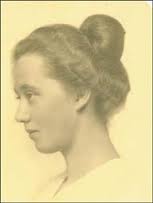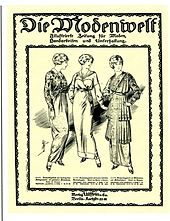Barbara von Treskow
Barbara von Treskow (born January 8, 1895 in Biedrusko near Posen , † March 8, 1972 in Wedel near Hamburg ) was a German women's rights activist and editor-in-chief of women's magazines.
Life
Her father was Albrecht von Treskow (1845–1901), landlord on Biedrusko. Barbara von Treskow studied in Berlin. Back in her home country, she married Walter Schubert, landlord in Nieder-Kaiserswaldau near Liegnitz in 1918, and had two children. After four years the marriage was divorced and she moved to Berlin with the children.
Berlin
She initially worked as a freelance writer for Ullstein Verlag , especially for Die Dame , an ambitious women's magazine that also printed texts by Tucholsky , Ringelnatz , Max Brod and Klabund . According to her family, Barbara von Treskow took part in campaigns by the women's movement for mothers and working women. In 1929 Die Dame published a detailed report on the World Association for Women's Suffrage. She showed nudes of expression dancers. The paper's image of women was just as incompatible with that of the National Socialists as articles by Jewish authors. After the seizure of power , leading editors of the magazine lost their work.
Barbara von Treskow, rose to editor-in-chief of Modenwelt (later: Neue Modenwelt ) in 1932 , a largely apolitical women's magazine published by Ullstein Verlag. Like Die Dame, the paper had to be discontinued in 1943. From 1932 to 1944 von Treskow organized Brigitten-Tage , politically free colorful evenings with show programs for women, for each of which up to 2000 tickets were sold. They took place five to six times a month. On their hundredth Brigittentag in February 1932, Dolly Haas , Claire Waldoff and Otto Reuter performed in the Schauspielhaus am Gendarmenmarkt . It is not certain whether the name of her daughter Brigitte played a role in the naming of the colorful evenings as well as the name of the later magazine Brigitte .
In 1933 she took over the editor-in-chief for a short time at Dies Blatt belongs to the housewife , a magazine that focused on the needs of middle class women with practical tips for everyday life . The magazine was the predecessor of Brigitte .
Hamburg
In 1950 Barbara von Treskow moved to Hamburg. Together with her friend, the textile designer Maria May , she founded the association for working women , a German branch of the American association Business and Professional Women . In December 1950, the women criticized in an article in TIME titled Female influence in politics - between activity and mothering the condescending perception of female members of the Bundestag . In 1954 the association organized the first UN meeting with experts from home and abroad. In 1964, Barbara von Treskow led a women's delegation to Moscow, Leningrad and Siberia to study the role of working women in the Soviet Union.
From 1952 to 1957 she worked for the liberal Hamburger Anzeiger as head of the women and fashion department . The editor-in-chief was the later FDP parliamentary group chairman Alfred Frankenfeld .
Works
- The kitchen and its seasons. Ullstein Verlag, Berlin 1935.
- with Johannes Weyl : The Housewife's Lexicon - A practical guide for home and family. Ullstein Verlag, Berlin 1933.
literature
- Tanja Fabian: Analysis of the magazine Die Dame 1932–1941 with special consideration of the National Socialist influence on fashion. Thesis. Vienna 2006.
- Sylvia Lott-Almstadt: Brigitte 1886 to 1986, the first hundred years chronicle of a women's magazine . Gruner and Jahr, Hamburg 1986, ISBN 3-570-04930-2 .
- Family association of the family v. Treskow: Barbara v. Treskow (1895–1972), journalist
- Thomas Wolfe: A trip to Germany in six stages. Literary pictures of the time 1926–1936. Edited by Oliver Lubrich. Translated from the English by Renate Haen, Barbara von Treskow and Irma Wehrli. Manesse Verlag, Munich 2020, ISBN 978-3-7175-2424-3 .
| personal data | |
|---|---|
| SURNAME | Treskow, Barbara von |
| BRIEF DESCRIPTION | German journalist, women's rights activist |
| DATE OF BIRTH | January 8, 1895 |
| PLACE OF BIRTH | Biedrusko |
| DATE OF DEATH | March 8, 1972 |
| Place of death | Wedel near Hamburg |


